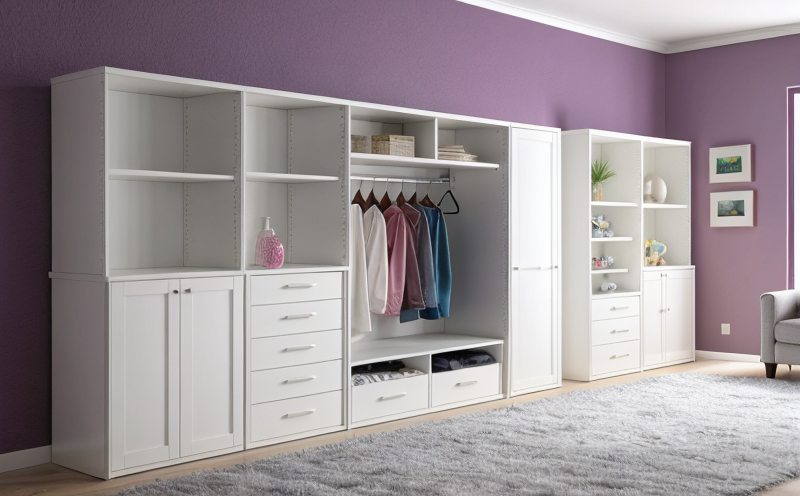ASTM D4060 Abrasion Resistance of Cabinet Laminates by Taber Method Testing
The ASTM D4060 test method is a standard procedure used to determine the abrasion resistance of cabinet laminates, which are commonly found in storage furniture. This testing protocol assesses how well these materials withstand wear and tear over time, ensuring they meet durability standards for quality products.
Storage furniture often incorporates laminate surfaces that come into frequent contact with household items or other objects. The Taber Abraser machine is used to simulate this real-world use by applying controlled abrasion forces against the sample surface. This helps manufacturers evaluate their product's longevity and performance under typical usage conditions, thereby enhancing customer satisfaction.
The test involves mounting a circular abrasive disk on an arm of the Taber machine that rotates at specified speeds and loads. The rotating disk then rubs against the laminate specimen placed on a fixed platform in the machine. A defined number of cycles is run to simulate extended periods of use, after which the amount of material removed from each cycle is measured.
The results provide valuable insights into the durability characteristics of cabinet laminates and can guide improvements in manufacturing processes or raw materials selection. By adhering strictly to ASTM D4060 guidelines, laboratories ensure accurate and consistent measurements across different samples and facilities.
Understanding the importance of this test for storage furniture is crucial for quality managers and compliance officers who need to maintain high standards within their organizations. R&D engineers can benefit from these tests as they help refine designs based on empirical data. Additionally, procurement personnel may use such information when selecting suppliers or negotiating contract terms.
For those involved in the production of storage furniture, knowing about ASTM D4060 ensures compliance with industry best practices and fosters innovation through continuous improvement efforts aimed at enhancing product quality and reliability.
This testing procedure plays a vital role in ensuring that products meet regulatory requirements and customer expectations regarding longevity and appearance retention. It supports the development of robust materials capable of enduring harsh environments typical to residential settings while maintaining aesthetic appeal over prolonged exposure.
Applied Standards
The ASTM D4060 standard specifies procedures for determining the abrasion resistance of cabinet laminates using the Taber method. This includes detailed instructions on preparing specimens, operating the equipment correctly, recording data accurately, and interpreting results reliably.
- ASTM D4060: Standard Test Method for Abrasion Resistance of Cabinet Laminates by Taber Abraser
- American Society for Testing and Materials (ASTM): Organization that develops standards for materials, products, systems, and services through worldwide cooperation.
These standards ensure consistency in testing procedures across various laboratories and facilities, providing accurate comparisons of results. Compliance with ASTM D4060 helps manufacturers demonstrate adherence to industry best practices and regulatory requirements.
Scope and Methodology
The scope of the ASTM D4060 test encompasses evaluating the abrasion resistance properties of cabinet laminates used in storage furniture. The methodology involves mounting a circular abrasive disk on an arm attached to a Taber Abraser machine, which rotates at predetermined speeds and loads.
During each cycle, the rotating disk rubs against the laminate specimen mounted on a fixed platform within the machine. A defined number of cycles is executed to simulate extended periods of use under typical conditions faced by users. After completing all cycles, the amount of material removed per cycle is measured precisely.
Data obtained from these measurements allows for detailed analysis of abrasion resistance performance characteristics. This information can be utilized for various purposes including quality control checks during production processes and development of new materials or products aimed at improving overall durability.
International Acceptance and Recognition
- Australia: The ASTM D4060 standard is widely recognized in Australia for its robust approach to assessing abrasion resistance of cabinet laminates. Compliance with this standard ensures products meet local regulations and industry expectations.
- Canada: Similar to the Australian market, Canadian manufacturers adhere to ASTM D4060 when producing storage furniture containing laminate surfaces. This adherence promotes uniformity in product quality across borders.
- United Kingdom: The UK also acknowledges ASTM D4060 as a reliable method for measuring abrasion resistance of cabinet laminates. It supports consistent testing practices within the region and contributes to improved product performance standards.
- New Zealand: Like many other countries, New Zealand incorporates ASTM D4060 into its framework for evaluating storage furniture materials. This integration facilitates seamless trade between nations and enhances global competitiveness among suppliers.
The widespread acceptance of ASTM D4060 underscores its significance in ensuring high-quality products that can withstand rigorous use conditions while maintaining aesthetic appeal over time. Its international recognition fosters trust among consumers who value durability and reliability when selecting storage furniture solutions.





